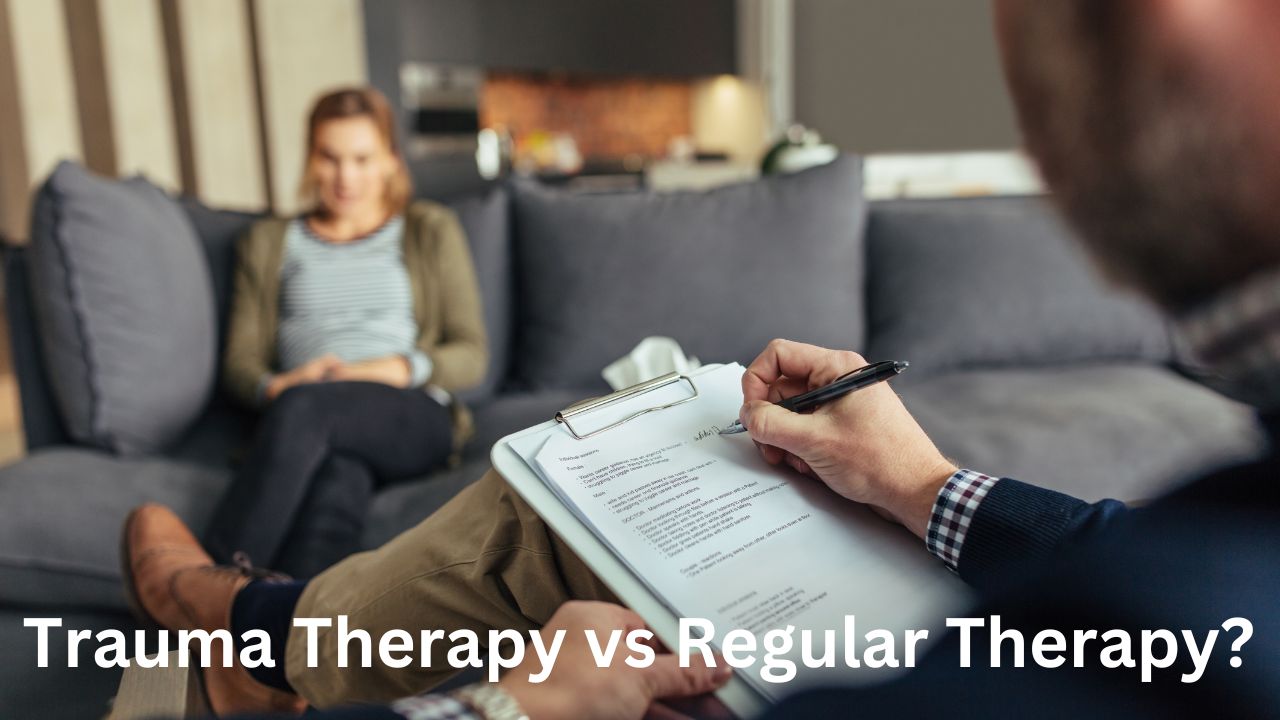What is the difference between Trauma Therapy and Regular Therapy?
In the realm of mental health and well-being, therapy serves as a beacon of support, offering individuals a safe space to explore their emotions, thoughts, and experiences.
However, within the vast landscape of therapy, distinct approaches emerge to address specific needs and challenges.
Two prominent modalities are trauma therapy vs regular therapy, each with its focus, techniques, and goals. Let’s delve into the differences between these two forms of therapy to gain a deeper understanding of their unique aspects and how they serve individuals seeking healing and growth.

Key Takeaways:
- Trauma Therapy: Specifically designed to address the effects of trauma, such as PTSD and childhood trauma.
- Regular Therapy: A broader term encompassing various therapeutic approaches aimed at addressing general mental health concerns and life challenges.
- Focus: Trauma therapy centers on processing traumatic experiences, while regular therapy may focus on a range of emotional and psychological issues.
Understanding Trauma Therapy:
This YouTube video below by Kati Morton explains what trauma therapy is and how it helps recovery. She outlines common approaches and treatment goals. This reference supports understanding therapeutic options for healing after trauma.
Trauma therapy, as the name suggests, is tailored to individuals who have experienced trauma. Trauma can manifest in various forms, such as physical, emotional, or psychological harm, often resulting from distressing events like accidents, abuse, or natural disasters. Here are key aspects of trauma therapy:
- Targeted Approach:
- Trauma therapy is highly specialized, focusing on addressing the effects of trauma on the individual’s mental, emotional, and physical well-being.
- Therapists in this field are trained in specific trauma-focused techniques, such as EMDR (Eye Movement Desensitization and Reprocessing) or TF-CBT (Trauma-Focused Cognitive Behavioral Therapy).
- Processing Traumatic Memories:
- The primary goal is to help individuals process and integrate traumatic memories and experiences.
- Techniques like exposure therapy or narrative therapy may be used to gradually confront and reframe traumatic events.
- Safety and Stability:
- Establishing a sense of safety and stability is crucial before delving into traumatic memories.
- Therapists focus on building coping skills and resources to manage distressing emotions and triggers.
- Addressing PTSD and Dissociation:
- Trauma therapy often targets specific conditions like Post-Traumatic Stress Disorder (PTSD) and dissociative disorders.
- Therapists help clients understand and manage symptoms such as flashbacks, nightmares, and dissociation.
Exploring Regular Therapy:
Regular therapy, also known as traditional therapy or counseling, encompasses a broad spectrum of therapeutic approaches aimed at supporting individuals in navigating life’s challenges and improving overall well-being. Here are key aspects of regular therapy:
- General Mental Health Concerns:
- Regular therapy addresses a wide range of mental health concerns, such as anxiety, depression, stress, and relationship issues.
- Individuals do not necessarily need to have experienced trauma to benefit from regular therapy.
- Varied Approaches:
- There are various modalities of regular therapy, including Cognitive Behavioral Therapy (CBT), Psychodynamic Therapy, Humanistic Therapy, and more.
- The choice of therapy depends on the individual’s needs and preferences, as well as the therapist’s expertise.
- Goal-Oriented Approach:
- Regular therapy often focuses on setting specific goals for therapy sessions, such as improving communication skills, building self-esteem, or coping with life transitions.
- Therapists work collaboratively with clients to achieve these goals through structured sessions.
- Enhancing Coping Skills:
- While trauma therapy also builds coping skills, regular therapy emphasizes developing general coping mechanisms applicable to various life situations.
- Skills such as stress management, emotion regulation, and problem-solving are commonly taught in regular therapy.
Key Differences:
Here’s a comparison table outlining the differences between trauma therapy and regular therapy:
| Aspect | Trauma Therapy | Regular Therapy |
|---|---|---|
| Focus | Primarily addresses trauma-related issues | Covers a broad range of mental health concerns |
| Techniques | Specific trauma-focused techniques | Various modalities (CBT, Psychodynamic, etc.) |
| Goal Orientation | Healing from traumatic experiences | Achieving diverse therapy goals |
| Training and Expertise | Specialized training in trauma treatment | Training in various therapeutic approaches |
| Intensity | Intense due to processing traumatic memories | Varies based on client’s needs and goals |
| Applicability | Specifically for trauma survivors | General mental health and life challenges |
| Typical Conditions | PTSD, childhood trauma, dissociative disorders | Anxiety, depression, stress, relationship issues |
Frequently Asked Questions (FAQs):
Q1: Can regular therapy help with trauma-related issues? A1: While regular therapy can offer support, trauma therapy is specifically designed to address the unique challenges of trauma.
Q2: How do I know if I need trauma therapy or regular therapy? A2: If you have experienced trauma and are struggling with its effects, trauma therapy may be beneficial. For general mental health concerns, regular therapy is appropriate.
Q3: Is trauma therapy more intense than regular therapy? A3: Trauma therapy can be intense due to the nature of processing traumatic memories. Regular therapy focuses on a broader range of emotional and psychological issues.
Q4: Can I switch between trauma therapy and regular therapy? A4: Yes, individuals may transition between the two based on their evolving needs and progress in therapy.
Q5: Do therapists specialize in both trauma therapy and regular therapy? A5: Some therapists are trained in both modalities, offering a comprehensive approach to addressing mental health needs.
Conclusion:
In the diverse landscape of therapy, both trauma therapy and regular therapy play vital roles in supporting individuals on their journey to healing and growth. Trauma therapy provides a specialized approach for those navigating the aftermath of traumatic experiences, offering targeted techniques and support.
On the other hand, regular therapy offers a broader spectrum of assistance, addressing a wide range of mental health concerns and life challenges. Whether seeking to process trauma or enhance overall well-being, therapy, in its various forms, stands as a beacon of hope and support for those embarking on the path to mental wellness. Explore the possibilities of therapy and find the approach that resonates with your needs and goals at Calming Mind Therapy.

